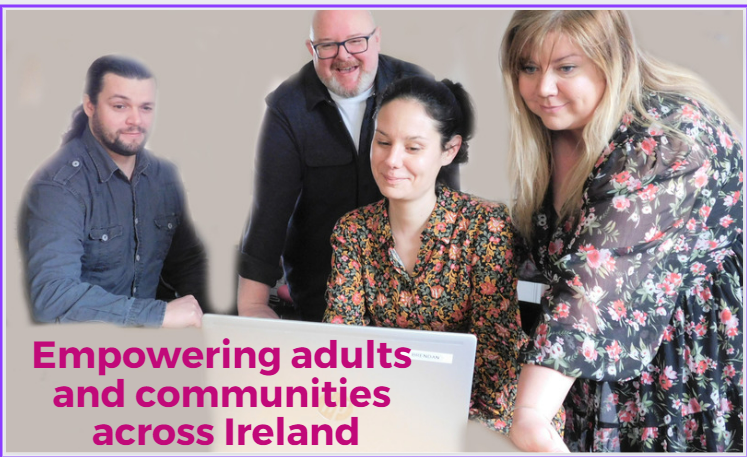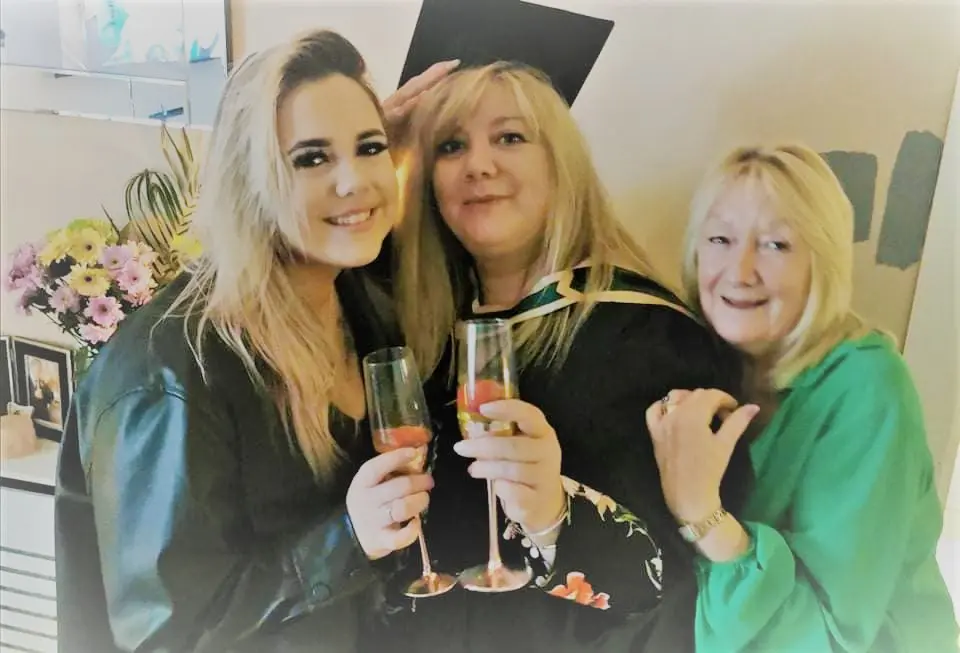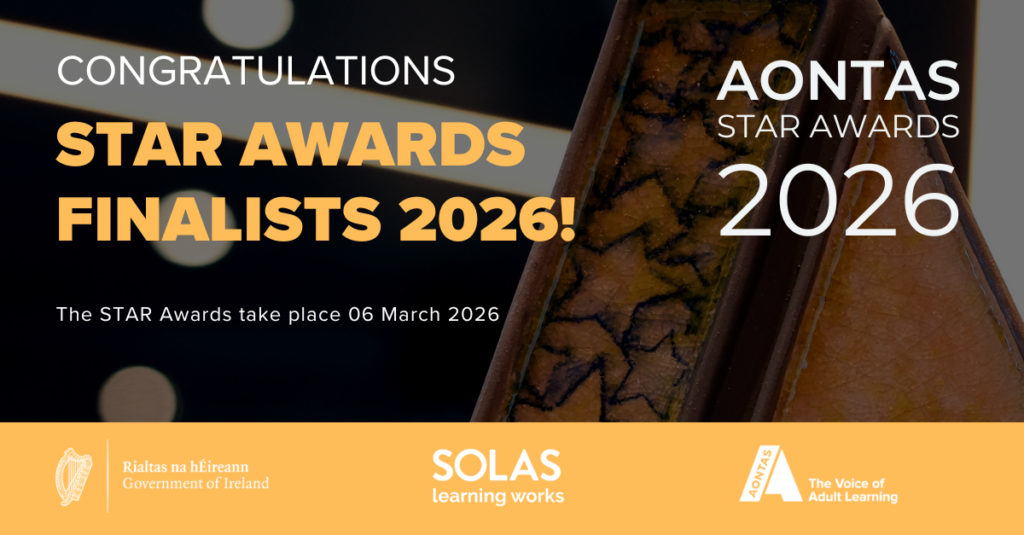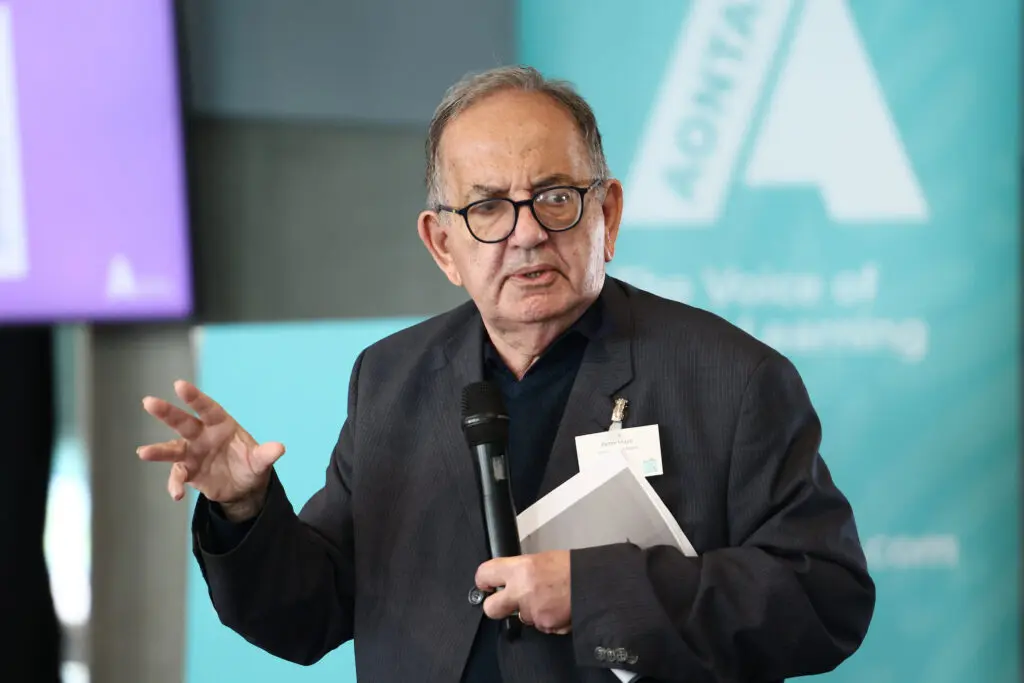“There came a point where I knew I needed to do something,” Ashling Johnston tells us over Zoom. “So, I walked into my local ETB [Education and Training Board] in Tallaght.”
Ashling had negative experiences at school, and she wasn’t comfortable with writing and spelling. But, at the age of forty, she figured that going back to education would help her get back into the workforce, having spent years at home looking after two children.
“I joined a very long queue, actually,” Ashling tells us, “at my local ETB in Tallaght Village, and I remember standing in that queue and thinking to myself: ‘This isn’t for me, I’m not going in here!’”
But she went in anyway. And her experience of going back to education as an adult was completely different to school. She started a Level 5 Business course. She was unsure whether she’d be able for it, but received lots of encouragement and support from tutors and staff there.
One of her tutors, Meliosa Bracken, a Community Education Facilitator at City of Dublin ETB, brought out laptops for people to use. “That was my first experience of someone giving me a tool.”
Ashling and her fellow learners were told they would learn how to do research. “And we were told we were going to be researching child psychology and child development. The Little Albert study was the first thing I was asked to research. For pretty much every woman in the room who had children, this was something that drew you in. It was a topic that drew me to the laptop.”
This idea came up at our recent webinar series, “Imagining Adult Education”, where we discussed how classes and courses should be led by what people are interested in.
“You have to be introduced to these things,” Ashling says. “I mean, you don’t know what you don’t know, before you know it!”
Learner Voice: Having a Say in Decisions About Education
Letting the people who are doing the learning lead the curriculum goes against most of our post-primary level school experiences. But this changes through the idea of “Learner Voice”, which means that learners should have a say in decisions about their own education. It means that those who learn, not just those who teach, should influence their experience of learning.
“It was very empowering to feel you had ownership over your own learning, and you were involved in how you wanted to progress,” Ashling says.
Through support from the tutors and the guidance counsellor Caroline Duffy from Dublin and Dún Laoghaire Education and Training Board, Ashling gained confidence. The staff were very different to her experience of post-primary school teachers.
“I’ve never known anybody to be so real, so themselves,” she says. “My experience in secondary school was that teachers are all knowing and that made me feel inferior.”
The Importance of Career Guidance
While doing her Level 5 course in General Business with IT Skills, Ashling was encouraged to start thinking about her next step.
Not all learning is about progression to higher level or university education. Some forms of learning have impact because they help people gain self-confidence, meet others, or develop a healthy routine. Doing an art course or a gardening class can be just as impactful to someone as learning a skill for employment. This is what we call community education.
“My initial engagement was what I see as adult community education,” Ashling says. “That centre in Tallaght village was in my community, it was people working for the people in their community.”
For those who might want to keep going with education, Ashling tells us it is essential to get options and ideas for what a person might want to do. Career guidance, she says, “should play a much more major role in individual learners’ experiences.”
The career guidance counsellor Caroline used to “hunt her down” between classes to give her a course prospectus. Caroline and Meliosa shared options with Ashling about what kind of course she could go on to do.
“I told her, ‘I’m too old, Caroline, I’ll be fifty when all that’s done.’ She told me that it didn’t matter, that I was going to reach fifty anyway, and when I got there I would just be minus a degree.”
Ashling realised she was interested in psychology. “Because my dad died of a brain haemorrhage, I started reading about the brain and watching free Harvard lectures on psychology on YouTube. And you can go on the website for Maynooth University and actually see the breakdown of each semester and the content of each module, so you can see if you are actually going to be interested in the subject. And I just thought, ‘Get me in there’.”
Caroline organised buses for the learners to go to open days. Ashling discovered she could get into psychology through the Arts.
“The women in the community believing in me and empowering me enough to go out and enquire about it, and their help in writing my letter to get in – that was enough.”
She found the process of finishing her Level 5 course challenging, “particularly the Accounting and Excel parts as these are both the subjects I struggled with in secondary school.”
“There was another woman in there, Niamh O’Connor, Project Co-ordinator in the Tallaght/Citywest area, and she was so patient. She told me, ‘just put it all out on the kitchen table’. I told her I would put it in the bin!”
But Ashling ended up getting Distinctions in all her modules.
“You set yourself up psychologically to fail before you’ve even begun. And you really need people behind you to help you understand that isn’t the case. And I tell my kids now, you can set yourself up to achieve, even having failed before. Where there’s a will, there’s a way.”
She realised she was actually interested in sociology and anthropology – which is more about studying people and cultures – than in psychology, which focuses a lot on statistics and analysis.
“I had such a wonderful experience, and it changed my life and my whole family’s life for generations to come. Even though the degree didn’t get me a job, it was empowering for me. To know that I was able to read the stuff, and understand it, and write at that level.”
From Learner to Teacher
Ashling went on to apply for the Higher Diploma in Adult and Further Education to teach, followed by a Masters in Adult, Community and Further Education at Maynooth. On the Higher Diploma course, she says, the co-creation of the content was fantastic: “It was all about connection, there were no barriers.”
As part of her teacher training, she had to do 100 hours of teaching practice. Associate Professor at Maynooth University, Camilla Fitzsimons recommended her to contact An Cosán in Tallaght.
“I really wanted to complete my teaching practice hours in more than one educational organisation,” she says, “and at the top of that list was An Cosán as they are known for their holistic educational practices. We had to source our teaching practice hours and knock on several doors to gain experience, so you needed to be confidently persistent.”
When asked about how she had the confidence to keep going back, and keep following up, she says, “I put that down to people empowering you. If you have two or three people around you that continually push a vibe onto you every day, you start to feel more and more powerful.”
She says that connecting with people and gaining confidence made her happier.
“We need to be careful with how we measure success. I absolutely don’t think it’s only about getting a job.”
She found herself drawn to digital tools that help people with their learning.
“Using the internet to watch videos and lectures can help gain a better understanding of a concept and this can be a game changer. When I found something hard to understand, I would watch videos explaining it in different ways until I was confident I understood. For many people, reading alone doesn’t suffice.”
Ashling began her teaching practice with Deirdre Bannon, An Cosán’s Childcare Tutor.
“Deirdre was intuitively student-centred and empowered me to use my own experiences and skills, and believe in the power of the holistic teaching and learning process. We co-facilitated Level 5 Childcare Modules, where I would bring in technology to make the content and the learning experience more accessible and relatable to learners. This was the beginning of a truly transformative learning experience for me in terms of tutoring.”
She did some of her teaching practice in the Tallaght community in An Cosán, moving on to teach courses in Excel and Word processing online. “I realised I could help people because I’d been through learning it as an adult myself.” She decided to “break it down to its simplest form.”
“I always wanted to know the why of everything. What is this for? Why would I use this? So that’s how I started with the students. Making everything relatable to students’ lives and experiences – even Excel – just makes the whole learning process easier and more enjoyable.”
She was also learning new things about Excel and re-learning. “I really loved the experience of the learning journey, of it being a mutual learning journey between myself and the students.”
How Technology Can Help Us Learn

Ashling is now the Digital Skills Tutor at An Cosán, helping people to gain basic digital skills, and confidence, helping people to shop and bank online, take part in online courses, connect online with friends and family, find a job, and do this safely and securely online.
Ashling works as part of a An Cosán’s Digital Inclusion team, offering training and one-to-one supports to people. Her main role is to support and train other community educators around the country to use and incorporate An Cosán’s digital inclusion tools to empower their own communities and individuals they support.
“Our Digital Inclusion Team aims to help bridge the digital skills gap in today’s society. Around half of all Irish adults lack basic digital skills and we hope to align with the European objective of having at least 80% of all adults having basic digital skills by 2030.”
“We recently launched Ireland’s first Get Yourself Online campaign, to support the furthest behind first. I feel deeply connected to this role because I used to be someone who felt left behind.”
Wellbeing and Childcare Support are Essentials for Education
When she returned to education, Ashling says, she struggled with taking time away from her family and her children. “I felt guilty. That’s a thing you battle with constantly.”
It was only through the support of the women around her, telling her their own stories, that she was able to keep going.
“Sometimes just hearing that story, that’s enough to know it’s possible. Just letting somebody know that they can, sometimes is just enough to make them believe that they can.”
But now, all she has achieved and the work she is doing, she says, “has changed my family hugely. Generational transformation. I can see it on a daily basis with my daughter, who has gone on to third level education as a direct result of watching Mammy over the last seven years.”
But access to education is still a problem for women who have young children. “I see so many women in that situation where they have a child and don’t have anyone to help mind the child, you can’t work because you can’t pay for childcare – you are trapped. And as a parent, you want to give your child everything you can, but you feel totally powerless to be able to do that.
Gaining digital skills and access to courses online opens things up for women to return to learning. Supports such as childcare also allow women opportunities or the chance to return to learning. An Cosán provides childcare onsite.
An Cosan’s wraparound support services is like wrapping somebody up in a blanket – that’s what the learning experience feels like for students in An Cosán.”
She goes on to say that the majority of the students she sees are parents, and that many of those are parenting alone.
“We understand how empowering women and giving them a sense of wellbeing and wraparound supports is critical for their learning journey. Nurturing the learner and bringing a sense of wellbeing into the classroom is essential to An Cosán’s approach to adult learning. It’s really about nurturing the person, being learner-centred and providing tailored supports to ensure no one is left behind.”
Learn more about An Cosán and their Get Yourself Online campaign.
Check out the Digital Stepping Stones tool and learn more about yourself and your digital skills.
AONTAS works with adult learning partners in Ireland and across Europe to make the digital divide a thing of the past. Read more about the To Switch Erasmus+ project, and our recent Learners As Leaders programme about the digital divide.
This piece from Ashling is being shared as part of the One Step Up information campaign, happening from 9th to 13th January 2023, as part of New European Agenda for Adult Learning (NEAAL) project One Step Up. This raises awareness about the benefits of returning to education as an adult.
Learn more by visiting https://www.onestepup.ie/ today or call us on freephone 1800 303 669 and chat with a member of the AONTAS team!





